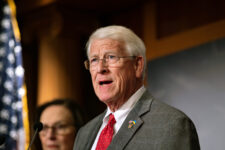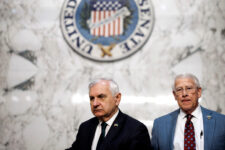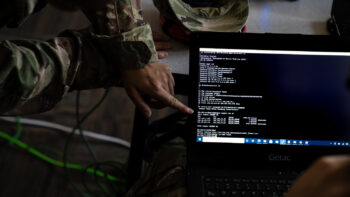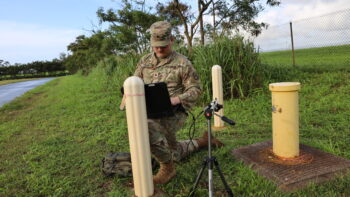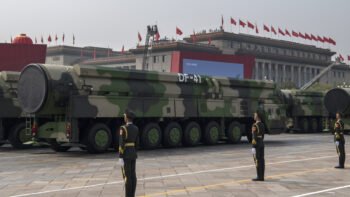This is James Kitfield’s first piece for Breaking Defense since his departure from his award-winning tenure at National Journal. As one of the best defense reporters around, Kitfield’s specialty has always been spotting the big strategic trend first and writing clearly, simply and persuasively about it. Following is a classic example of his work, which our readers will see roughly once each month. The Editor.
When President Barack Obama spoke from the White House last September to rally a war-weary nation behind limited strikes against Syria, the vast power he wielded as commander-in-chief seemed more curse than blessing. The United States was the only nation that could punish and deter a dictator from continuing to slaughter his own people with chemical weapons, Obama argued, even as Congress sought to tie his hands and reject a military option the American public overwhelmingly opposed. So the president who campaigned as the man to get America out of its wars was left to argue that military action made sense when an important principle was at stake.
“What kind of world will we live in if the United States of America sees a dictator brazenly violate international law with poison gas and we choose to look the other way?” Obama asked, stressing at the same time that the United States was not the world’s policeman. “But when, with modest effort and risk, we can stop children from being gassed to death, and thereby make our own children safer over the long run, I believe we should act. That’s what makes American different. That’s what makes us exceptional.”
Call it the curse of the “indispensable nation.” With an unmatched military — the only one with truly global reach — presidents feel constant pressure from political factions, interest groups and close allies alike to right the world’s myriad wrongs using our military for the simple reason that we alone can. That sense of uniqueness also plays to a national psyche nursed on the mother’s milk of ‘American Exceptionalism,’ and a strategic culture that favors decisive action and quick fixes. With new military technologies that can translate the waggle of a joystick in Nevada into an explosion half a world away, the reflex can be even stronger to reach for the hammer in America’s superpower toolbox, and to view international problems as a nail.
In his new memoir “Duty: Memoirs of a Secretary at War,” Robert Gates argues passionately for a change in the strategic calculus behind America’s use of military force. Gates was the only defense secretary to serve two presidents, from different political parties, in two costly and ultimately unsatisfying conflicts.
“Today, too many ideologues call for U.S. force as the first option rather than a last resort,” Gates writes. “On the left, we hear about the ‘responsibility to protect’ civilians to justify military interventions in Libya, Syria, Sudan and elsewhere. On the right, the failure to strike Syria or Iran is deemed an abdication of U.S. leadership. And so the rest of the world sees the U.S. as a militaristic country quick to launch planes, cruise missiles and drones deep into sovereign countries or ungoverned spaces… Our foreign and national security policy has become too militarized, the use of force too easy for presidents.”
Unchained Superpower
During the nearly half-century standoff of the Cold War, counsels on the use of military force were tempered by fears that a confrontation between the United States and the Soviet Union could end in nuclear Armageddon. Even that restraint was not enough, however, to dissuade Washington from the Vietnam War, which cost the lives of more than 58,000 service members and ended in the U.S. military’s first major defeat.
With Vietnam firmly in mind, former Chairman of the Joint Chiefs Colin Powell, a Vietnam veteran, proposed what became known as the “Powell Doctrine.” Devised in 1990 to dissuade civilian leaders from stumbling into military actions without thinking through the potential repercussions, it amounted to a sort of when-to-use-military-force template. According to the “Powell Doctrine,” U.S. leaders should use military force only:
- If a vital national security interest was threatened and the U.S. military was given a clear and attainable objective;
- When the risks and costs had been fully analyzed and all nonviolent policy options exhausted;
- When there was a plausible exit strategy to avoid “endless entanglement”;
- When the proposed action enjoyed broad support from the American people and the international community.
Ironically, two signature successes during Powell’s tenure as Chairman of the Joint Chiefs conspired to render his doctrine obsolete: the end of the Cold War; and the overwhelming victory of U.S. military forces over the Iraq Republican Guard in the 1991 Persian Gulf War. Those historic achievements ushered in an era in which U.S. military action was viewed as quick, decisive and relatively low-cost.
“The lesson that many Americans drew from those nearly simultaneous events was that we had war figured out, and had achieved such a level of military dominance that it would be our strong suit throughout the post-Cold War era,” said Andrew Bacevich, professor of International Relations and History at Boston University, and author of “The New American Militarism: How Americans are Seduced by War.” “That notion that military power provides a way to fix problems decisively and quickly took hold in our national psyche, and it carried over into our politics.”
Politics of Intervention
That notion gave rise to liberal interventionists who argued that an international community — inevitably led by the United States — had a responsibility to intervene when countries failed to protect their own people from crimes against humanity. The principle, later adopted by the United Nations, was used to advocate U.S. military interventions in Somalia, Haiti, and the Balkans in the 1990s. After 19 U.S. troops were killed in the “Blackhawk Down” incident during a peacekeeping operation in Somalia in 1993, President Bill Clinton declined to intervene in the 1994 genocide in Rwanda, and later described it as one of his greatest regrets as president. Former Secretary of State Madeleine Albright described America’s role in this post-Cold War era as that of the “indispensable nation,” pointedly asking Powell at one point, “What’s the point of having this superb military that you’re always talking about if we can’t use it?”
On the right, the notion that unmatched U.S. military supremacy should be used to advance U.S. ideals such as democracy and freedom gave rise to the neoconservatives, who by the late 1990s had supplanted Republican “realists” like Gates and Powell as the dominant foreign policy voice in the GOP. Heavily represented in the George W. Bush administration by officials such as Deputy Defense Secretary Paul Wolfowitz, the neoconservative ideology found voice in Bush’s expansive, post-9/11 “global war on terror,” and the wars in Iraq and Afghanistan intended to bring American ideals to those countries and regions.
“Even if you give the Bush administration the benefit of the doubt in deciding to invade Iraq, what prudent analysis led them to believe we could topple Saddam Hussein and occupy Baghdad, and then leave in a matter of a few months? I never saw that analysis,” said retired Lt. Gen. James Dubik, a senior fellow at the Institute for the Study of War, and a former commander in Iraq. Nor did Dubik see a rational analysis of how U.S. military forces could quickly topple the Taliban regime in Afghanistan, hand that country off to the international community and expect to see democracy flourish.
“So Bob Gates is exactly right in arguing that we need to decide not only whether military action is moral and legal, but also prudent in terms of accomplishing your political goals at acceptable cost,” said Dubik. U.S. participation in the NATO operation that toppled the regime of former dictator Muammar Gaddafi in 2011, he argues, suggests that the United States is still too quick to embrace the military option. “Gaddafi may be gone, but we’re left today with second order consequences that no one thought through very well,” said Dubik.
Videogame War
Gates also argues in his book that the technologies behind the United States’ targeted killing program – where unmanned drones eviscerate suspected terrorists in distant lands, their shredded bodies conveniently disappearing in the blast clouds from Hellfire missiles – has created a misguided perception of war almost by immaculate conception. “For too many people – including defense ‘experts,’ members of Congress, executive branch officials and ordinary citizens – war has become a kind of videogame or action movie: bloodless, painless and odorless.” In his many trips to the front lines and the hospital wards Gates was close enough to the true article to smell the unmistakable rot of war.
But a sterilized view of war, says Steven Metz, director of Research at the Army War College’s Strategic Studies Institute, is in keeping with America’s strategic culture, one that is impatient and averse to ambiguity and complexity. “We have a collective national psyche that tends to conceptualize foreign and national security policy using sports metaphors: ‘Americans play to win, not to tie.’ As a result our leaders feel compelled to resolve problems quickly and then move on to the next issue before our attention span wanes, not to just manage problems that can’t actually be resolved. For all of those reasons, the military is often the preferred tool of U.S. statecraft. The Defense Department is also the one agency in the U.S. government dominated by Type-A, ‘can-do’ personalities, and they often feel compelled to fill the policy vacuum.”
After two unpopular wars and the most protracted period of conflict in U.S. history, however, Pew Research Polls have found that isolationist sentiment in the public hit a 50-year high in 2013, with a majority of Americans agreeing — for the first time — that “the U.S. should mind its own business internationally and let other countries get along the best they can on their own.”
The lives of nations are cyclical, and the evidence suggests that the body politic is rethinking an era of excessive, if often well-intentioned, American militarism. In that sense Robert Gates’ observations from a Cold War warrior and realist strike a resonant chord. “I think we’re reentering a period of great reluctance to intervene militarily, and it’s likely to last for quite a long time,” said Andrew Krepinevich, president of the Center for Strategic and Budgetary Assessments. As one Army general recently told me, ‘We’ve had our hand on this stove in Iraq and Afghanistan for more than a decade, and when we take it off, we’re not going to be eager to put our hand back on that stove. Neither will the American public.”
From Boeing’s struggles to inflation relief funds: 5 industry stories from 2024
Making a year-end list in which she forces references to Taylor Swift songs for no reason has basically become reporter Valerie Insinna’s favorite Christmas tradition.


